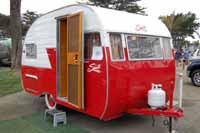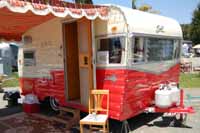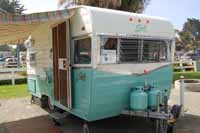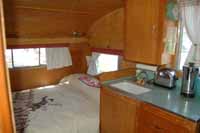|
|
Trying to figure out what year your vintage Shasta trailer was built, will often involve some research and sleuthing.
Original production unit counts from the Shasta factory have been lost to time, and finding original dealer brochures and pamphlets can
be very difficult. In addition, registering a travel trailer back in the 1950's and 1960's was often a casual exercise and it wasn't uncommon
for a new trailer to be licensed by the state with the wrong year on the
registration document. Adding to an already murky situation, trailer owners often lost track of the
|
registration paperwork for
"that old trailer sitting behind the barn". You would think that with the large number of trailers produced by Shasta and still in existence today,
that tracking down your vintage Shasta trailer's birth date would be a fairly simple task. Unfortunately, it's usually not.
So to make your quest a little easier,
here's a chronological list of Shasta trailer features and design changes over the years:
• The Shasta company has been building trailers since 1942, producing their "Cozy Cruiser" trailer models through model year 1951.
The company began building "Shasta" brand trailers in model year 1952.
• For model years 1952 through 1957, Shasta trailers didn't change

much. During this era Shastas had no "wings", but with a rounded profile front and back,
no rear bumper, 3 separate window frames across the front, a wooden screen door and wonderful honey gold shellacked birch interior woodwork,
these early Shastas are the epitome of the classic "canned ham" trailer.
Shasta trailers were available in several different lengths but the overall shape and design features were very similar across the model range.
• Shasta introduced big changes starting with model year 1958.

The most noticable change was in the front profile which now leaned forward at the top
as it curved up into the roof, instead of the simple rounded front end on the 1952 - 1957 Shasta models.
The other big change starting in 1958 was the pair of unique shiny ribbed
"wings" that now adorned both sides of the trailer at the rear, jutting boldly backwards to evoke a whimsical feeling of "winged flight". These wonderful
wings were unique to the Shasta trailer and when you see a vintage trailer with wings today, you immediately recognize it as a Shasta.
If your vintage Shasta trailer has the "upper leaning forward" front end but no wings, the wings may have been there originally but were removed by a previous
owner at some point in the trailer's life. Look for tell-tale screw holes in the siding at the upper back of the trailer, as a clue that your
Shasta had wings when it left the factory and is therefore a post 1957 model. The 1958 models also now came with a heavy-duty u-channel bumper
across the back of the trailer, that was welded solidly to the trailer's frame. Shasta model years 1958-1960 generally share all of these attributes.
• More changes came along in 1961. Shasta trailers

now came with a light weight aluminum screen door
instead of the classic old wooden screen door. For the interior, the old-fashioned radiased (rounded) corners on the cabinets were replaced
with a modern right-angle corner. In addition, Shasta was now building some trailers with interior woodwork finished with a "modern"
slightly milky finish instead of the traditional but more labor-intensive "golden amber" shellacked finish from previous years.
The iconic "Shasta Wings" were still affixed to every Shasta, but now instead of the old wood-core "wrap-around" wings
that stepped over the trailer's side gutter molding, the gutter molding was notched to fit the new "flat" wings which now had an aluminum core and were attached
to the side of the trailer using rubber spacers so the wing sat off the siding by about 1/2".
• For model year 1965, Shasta introduced big changes again. The rounded front and rear exterior profiles were flattened quite a bit for a more
modern "squared-off" design. But even with this new design direction, the beloved "Shasta wings" remained, and still appeared on the sides of
Shasta trailers into the mid 80's.
• These design changes may help you get close to determining your Shasta's birth date, but wouldn't it be great if the factory stamped the
year-of-manufacture on your trailer? Fortunately, on some Shastas the factory left some tantalizing clues that could tell you exactly the year your

Shasta was built. The first place to look is on the outside of the sink. Open the cabinet doors below the sink and closely examine the side of the sink and you
may get lucky and find the manufacture date stamped there by the factory. Another place to check is behind the mirror attached to the hallway cabinet door.
Carefully remove the screws that attach the mirror to the door and look for a date stamped on the door behind the mirror, or
on the backside of the mirror itself.